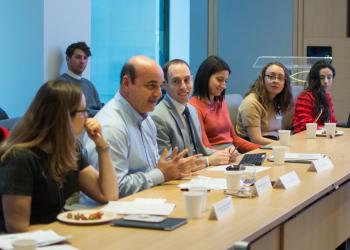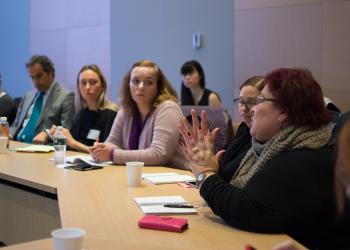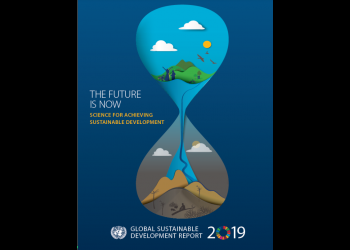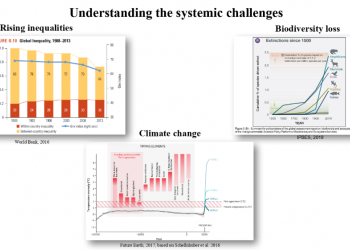Analysis of Sustainable Development Goal implementation presented at BIC
Every four years a team of scientists is to produce an assessment of the implementation of the Sustainable Development Goals (SDGs). The first such report, known as the “Global Sustainable Development Report” was released in September of this year and was presented to over 50 participants at a breakfast meeting at the Baha’i International Community’s (BIC) Office on Wednesday, 6 November.
“This was truly a landmark report from a political perspective because this is the first time that the General Assembly body has provided a platform for scientists to speak to them directly in connection with the SDG review and to take part in this conversation with a view to informing their decisions,” shared Shantanu Mukarjee, Chief, Policy and Analysis Branch at Division for Sustainable Development, UN DESA.
In his opening comments at the meeting, Daniel Perell, Representative of the Baha’i International Community to the United Nations, noted that this report’s “analysis of transformation challenges us to question what it is that convinces us to make changes to our lives and to our policies.”
“It demands that we move beyond the assumed link between science and policy to determine what drives change from us as individuals up to the largest governments and corporations. It calls on us to question notions of success currently associated with material progress. And it calls for deep changes to entire disciplines of study.”
Specifically, the report notes that “economic activity should be seen not as an end in itself, but rather as a means for sustainably advancing human capability.”
The document was drafted by 15 scientists from around the world, two of whom presented the report at the meeting—Eun Mee Kim from Ewha Womans University in Seoul, Korea and Eeva Furman from the Finnish Environment Institute, SYKE.
In summarizing the challenge of sustainable development before the international community, Ms. Furman stated that to “help all the nations and all the regions to move forward, we see that in addition to the SDGs, we need … something that is really from the societies themselves.”
Ms. Furman noted that four types of levers are needed for the global community to move forward. “Those are our governments, the economy and finances, the individual, and behavioural change; plus collective action as well as the capacity from science and technology.” And, crucially, “they are not competing with each other, but we need all these levers to act and be integrated and support each other.”
In its observations and calls to action, the report reconceptualizes important aspects of the development process. For example, it suggests that innovation and research can no longer be approached as processes taking place primarily in the global North, the results of which are shared with the South. Rather, all regions and peoples must take part in the generation and application of knowledge.
The report also emphasizes the importance of building on agreed principles of good governance, such as involving grassroots actors in policy-making, finding opportunities for collaboration across sectors, and building coordination and consensus.
Ultimately, as Ms. Kim stated in her concluding remarks, the challenge is about turning research into action: “We have enough scientific evidence and we have enough research that has already been done, we need to use them now to move forward to achieve the SDGs.”
Notes of the meeting can be found here.







